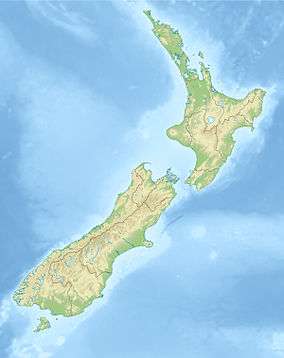Mokihinui Hydro
| Mokihunui Hydro | |
|---|---|
 Location of Mokihunui Hydro in New Zealand | |
| Country | New Zealand |
| Coordinates | 41°31′S 171°56′E / 41.517°S 171.933°ECoordinates: 41°31′S 171°56′E / 41.517°S 171.933°E |
| Status | Cancelled |
| Owner(s) | Meridian Energy |
| Thermal power station | |
| Primary fuel | Hydropower |
| Power generation | |
| Nameplate capacity | 85 MW (114,000 hp) |
The Mokihunui Hydro was a proposed hydroelectric dam and power station planned for the conservation land in the Mokihinui River on the West Coast of New Zealand. The project, developed by Meridian Energy was expected to cost $300 million. In April 2010, resource consents to dam the Mokihinui River were granted to Meridian.[1]
In May 2010 the Department of Conservation lodged an appeal with the Environment Court.[2]
On 22 May 2012 Meridian Energy cancelled the project, withdrawing it from the Environment Court. The project was withdrawn due to high costs and environmental concerns[3] and the project's risks and uncertainties.[4]
Description
The 85-megawatt (114,000 hp) power station was expected to generate up to 360 gigawatt-hours (1,300 TJ) a year,[1] or 14 percent more than the annual electricity consumption of the entire West Coast region (317 gigawatt-hours (1,140 TJ)). It would also provide much needed electricity generation to the Upper South Island, as local generation is well short of local demand and most of the electricity has to be transmitted from the Waitaki Valley, over 600 kilometres (370 mi) away.
Consultation
In 2007, Meridian Energy Limited consulted affected parties about its proposal to place a hydro-electric dam on the Mohikinui River.[5] The dam would have been located 3 kilometres (1.9 mi) upstream from Seddonville, between it and the Mokihinui River Forks. Meridian Energy began investigating the proposal in 2006, following from similar studies conducted by the New Zealand Ministry of Works in the 1960s and 1970s.[6] On 15 March 2008, the West Coast Regional Council called for public submissions on Meridian's applications for resource consents. Forest and Bird opposed the dam and accused Meridian of not making public a report from Landcare Research that advised that the hydro scheme would cause significant adverse environmental effects.[7]
Recreational use after construction
Meridian Energy stated that there would be recreational benefits with the lake formed by the proposed dam. Boat ramps would be provided for access onto the new lake. A local trust was planned that would have an access track, called the "Old Ghosts Road", pushed through to Lyell, following a historic gold miners route.
Opposition
Opposition to the proposal had been expressed by a number of conservation, recreational, environmental and fishing organisations including:[8]
- Buller Conservation Group
- Council of Outdoor Recreation Associations of NZ
- Department of Conservation
- Federated Mountain Clubs
- Fish and Game New Zealand
- Royal Forest and Bird Protection Society of New Zealand
- Green Party of Aotearoa New Zealand
- NZ Federation of Freshwater anglers
- New Zealand Historic Places Trust
- NZ Rafting Association
- NZ Recreational Canoeing Association
- West Coast Environmental Network
- West Coast Tai Poutini Conservation Board
- West Coast Waitbaiter's Association
- World Wildlife Fund NZ[9]
The opposition was due to number of reasons: the river and the 330-hectare (820-acre) of forest that would be inundated has high intrinsic natural values, it is regarded as a scenic river, and it has valued recreational use for whitewater activities and tramping.
In April 2010, the Department of Conservation stated that it had lodged an appeal with the Environment Court of the decision to grant the resource consents to Meridian Energy.[2]
See also
References
- 1 2 "Meridian's West Coast hydro dam gets go-ahead". National Business Review. 6 April 2010.
- 1 2 "Mokihinui Hydro Proposal on hold". Department of Conservation. Retrieved 2012-05-22.
- ↑ Alan Wood (2012-05-22). "Meridian pulls plug on Mokihinui project". Stuff. Retrieved 2012-05-22.
- ↑ "Meridian exits hydro dam plan". Radio New Zealand. 22 May 2012. Retrieved 22 May 2012.
- ↑ "The Mokihinui Hydro Proposal". Meridian Energy. Retrieved 9 December 2007.
- ↑ "Mokihinui Hydro Factsheet" (PDF). Meridian Energy. October 2007. Retrieved 9 December 2007.
- ↑ "Forest & Bird calls on Meridian to come clean over Mokihinui cover-up". Royal Forest and Bird Protection Society. 19 March 2008. Retrieved 4 April 2008.
- ↑ Henzell, John (2008-08-23). "Groups vow to halt dam". The Press. Fairfax. Retrieved 2008-08-31.
- ↑ "Mokihinui river dam plan poses ecological disaster". WWF New Zealand. 7 April 2012. Retrieved 18 February 2012.
External links
- The Mokihinui Hydro Proposal - resource consent applications, submissions and decisions of the hearing panel considering the proposal on behalf of the Buller District Council and the West Coast Regional Council
- Mokihinui Hydro Proposal at Meridian Energy
- Save the Mokihinui: Too Precious to Dam - Forest and Bird campaign
- A tale of two rivers a film by Dave Kwant and Bill Parks